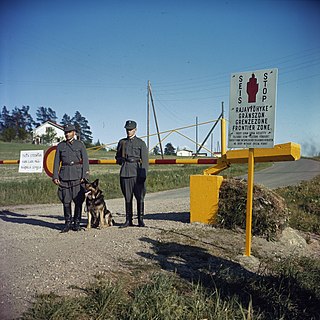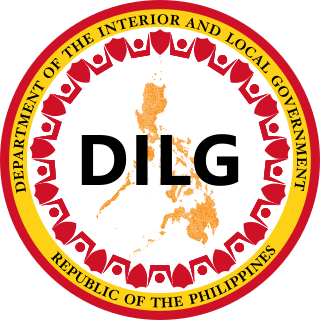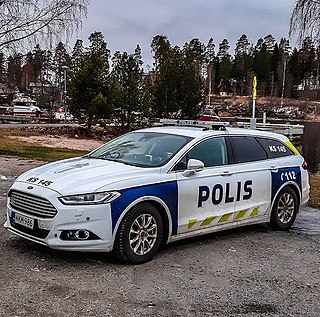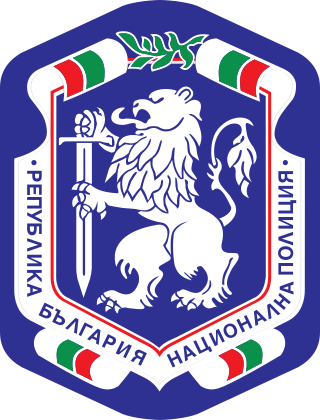Related Research Articles

A coast guard or coastguard is a maritime security organization of a particular country. The term embraces wide range of responsibilities in different countries, from being a heavily armed military force with customs and security duties to being a volunteer organization tasked with search and rescue without law enforcement authority. In most countries, a typical coast guard's functions are distinct from those of the navy and the transit police, while in certain countries they have similarities to both.

South Korea has a relatively unified and integrated approach to law enforcement. For example, the National Police Agency (NPA) provides all general policing services throughout the country. Due to the unitary system, local police organizations are directly under the NPA.

The National Police, formerly known as the Sûreté nationale, is one of two national police forces of France, the other being the National Gendarmerie. The National Police is the country's main civil law enforcement agency, with primary jurisdiction in cities and large towns. By contrast, the National Gendarmerie has primary jurisdiction in smaller towns, as well as in rural and border areas. The National Police comes under the jurisdiction of the Ministry of the Interior and has about 145,200 employees. Young French citizens can fulfill their mandatory service in the police force.

The Kosovo Police is the national policing law enforcement agency of Kosovo. It was established in 1999 and took its current form with the 2008 police law. It consists of five departments and eight regional directorates and is represented at the political level by the Ministry of Internal Affairs and Public Administration of the Republic of Kosovo.

The National Police Agency, Ministry of the Interior is an agency under the Ministry of the Interior of the Republic of China (Taiwan). The agency oversees all police forces on a national level, and is headquartered in Taipei.
The Danish Security and Intelligence Service is the national security and intelligence agency of Denmark. The agency focuses solely on national security while foreign intelligence operations are handled by the Danish Defense Intelligence Service.

A border guard of a country is a national security agency that ensures border security. Some of the national border guard agencies also perform coast guard and rescue service duties.

The Department of the Interior and Local Government is the executive department of the Philippine government responsible for promoting peace and order, ensuring public safety and strengthening local government capability aimed towards the effective delivery of basic services to the citizenry.

The Ministry of Justice Investigation Bureau, is a Republic of China (Taiwan) agency responsible for criminal investigation and intelligence gathering. It is subordinate to the Ministry of Justice, and its personnel are classified as judicial police. The headquarters is located in Xindian District, New Taipei City, Taiwan. The bureau has investigation offices and maritime investigation offices in the provinces and municipalities and investigation stations in each county and city. It is responsible for tasks related to maintaining national security and investigating major crimes. Additionally, there are mobile workstations in four regions : northern, central, southern, and eastern, which serve as specialized case-handling units. Its anti-corruption work is similar to that of the Independent Commission Against Corruption or the Corrupt Practices Investigation Bureau (Singapore). Its anti-drug operations are akin to those of the FBI and the Drug Enforcement Administration (USA). MJIB is a National Member of Egmont Group of Financial Intelligence Units and Asia/Pacific Group on Money Laundering.

The North Rhine-Westphalia (NRW) State Police Force is the largest of the 16 German state police forces with around 50,000 personnel.

Law enforcement in Finland is the responsibility of several agencies. The Police of Finland, a national police agency, is responsible for most tasks. The two other main agencies are the Finnish Border/Coast Guards and the Finnish Customs. Examples of other agencies with limited policing powers are the Finnish Defence Forces, municipal parking inspectors and railway staff.
Law enforcement in Taiwan operates primarily through governmental police agencies.
The counter-terrorism page primarily deals with special police or military organizations that carry out arrest or direct combat with terrorists. This page deals with the other aspects of counter-terrorism:

In many countries, particularly those with a federal system of government, there may be several law enforcement agencies, police or police-like organizations, each serving different levels of government and enforcing different subsets of the applicable law.

The National Police Service, also known as the GeneralDirectorate "National Police" is an independent agency of the Ministry of the Interior responsible for general law enforcement in Bulgaria.

The Police of Republika Srpska is the executive and operative agency of the Ministry of Interior of Republika Srpska, and is headquartered in Banja Luka.
The Police University College is a university of applied sciences in Tampere, Finland providing police academy training and research under the Ministry of the Interior for the Police of Finland and other Finnish law enforcement units.

The Ministry of Interior of Bulgaria is the ministry charged with the national security and the upholding of law and order in the country.

The State Police of Latvia is the national police service and one of the national law enforcement agencies of the Republic of Latvia. It is subordinate to the Ministry of the Interior. The agency is divided into five Regional Administrations. Since the 13th of October 2020, the Chief of the State Police is General Armands Ruks.
References
- 1 2 3 4 "National Police Board of Finland". Police. Retrieved 2024-04-01.
- ↑ "Personnel information". Exploreadministration.fi. Retrieved 2024-04-01.
- ↑ "Financial statements and reports on operations". Police. Retrieved 2024-04-01.
- ↑ "Organisation of the National Police Board of Finland". Police. Retrieved 2024-04-01.
- 1 2 "Agencies and responsibilities - Ministry of the Interior". Sisäministeriö. Retrieved 2024-04-01.
- 1 2 "Poliisihallitus aloittaa toimintansa 1.1.2010". Sisäministeriö (in Finnish). 2009-06-25. Retrieved 2024-04-01.
- ↑ "Poliisihallituksen organisaatiokaavio 2018". Arpajaishallinto. Retrieved 30 August 2020.
- ↑ "National Police Board of Finland, units and services". Police. Retrieved 2024-04-01.